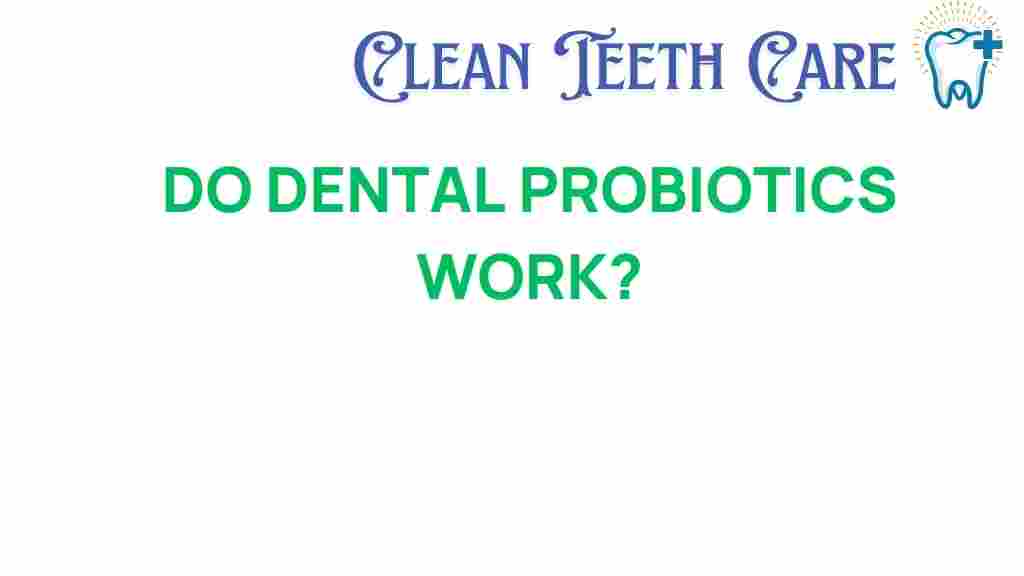Do Dental Probiotics Really Make a Difference for Your Smile?
In recent years, the concept of dental probiotics has gained significant attention in the realm of oral health. As we become increasingly aware of the importance of maintaining a balanced bacteria balance in our mouths, dental probiotics have emerged as a potential game-changer in preventing gum disease, cavities, and even improving the overall quality of our smiles. But do they really make a difference? In this comprehensive article, we will explore the science behind dental probiotics, their benefits, and how they can contribute to your dental care routine.
Understanding Dental Probiotics
Dental probiotics are live microorganisms that, when consumed in adequate amounts, can confer health benefits to the host—in this case, your oral cavity. These beneficial bacteria work to restore and maintain a healthy microbiome in your mouth, which plays a crucial role in preventing various dental issues.
The Role of Bacteria in Oral Health
Our mouths host a diverse array of bacteria, some of which are beneficial while others can lead to problems like gum disease and cavities. A balanced oral microbiome is essential for:
- Preventing Gum Disease: Healthy bacteria help to combat harmful pathogens that cause inflammation and periodontal disease.
- Cavity Prevention: Certain probiotics produce substances that inhibit the growth of cavity-causing bacteria.
- Fresh Breath: Good bacteria can help reduce bad breath by outcompeting odor-causing bacteria.
How Dental Probiotics Work
Dental probiotics function similarly to probiotics taken for gut health. They work by:
- Colonizing the Oral Environment: Beneficial bacteria attach to the surfaces in your mouth, forming a protective barrier against harmful bacteria.
- Producing Antimicrobial Substances: Probiotics can produce natural antibiotics that inhibit the growth of pathogenic bacteria.
- Modulating Immune Responses: These probiotics can enhance your body’s immune response to infections in the mouth.
Types of Dental Probiotics
There are several strains of probiotics that have been studied for their beneficial effects on oral health, including:
- Lactobacillus reuteri: Known for its ability to reduce gum inflammation and improve overall oral health.
- Streptococcus salivarius: A strain that helps freshen breath and supports gum health.
- Bifidobacterium: This strain may enhance immune responses and reduce the presence of harmful bacteria.
The Benefits of Dental Probiotics
Incorporating dental probiotics into your daily routine can provide several benefits:
1. Gum Disease Prevention
Research indicates that dental probiotics can significantly reduce the risk of gum disease by lowering inflammation and harmful bacteria levels. These probiotics create an unfavorable environment for pathogenic bacteria, thus promoting healthier gums.
2. Cavity Prevention
Dental probiotics can help prevent cavities by:
- Inhibiting the growth of cavity-causing bacteria like Streptococcus mutans.
- Producing acids that are less harmful to tooth enamel compared to the acids produced by pathogenic bacteria.
3. Teeth Whitening
While dental probiotics are not a direct teeth whitening solution, maintaining a healthy oral microbiome can help prevent discoloration caused by harmful bacteria and plaque buildup. A healthy mouth reflects brighter teeth.
4. Fresh Breath
Dental probiotics can significantly improve halitosis (bad breath) by:
- Outcompeting odor-causing bacteria.
- Reducing the production of volatile sulfur compounds in the mouth.
Incorporating Dental Probiotics into Your Routine
To reap the benefits of dental probiotics, consider the following steps:
Step 1: Choose the Right Probiotic
Look for dental probiotic products that contain specific strains proven to enhance oral health. Always check for:
- The presence of effective strains like Lactobacillus reuteri and Streptococcus salivarius.
- Third-party testing for quality and potency.
Step 2: Follow the Recommended Dosage
It’s essential to adhere to the recommended dosage on the product label. Overconsumption may not yield additional benefits and could disrupt the balance of your oral microbiome.
Step 3: Combine with Good Dental Care Practices
For optimal results, integrate dental probiotics into a comprehensive dental care routine that includes:
- Brushing your teeth at least twice a day with fluoride toothpaste.
- Flossing daily to remove plaque between teeth.
- Regular dental check-ups and cleanings.
Step 4: Monitor Your Oral Health
Keep an eye on your oral health as you incorporate dental probiotics. Look for improvements in gum health, cavity development, and breath freshness. If you notice any adverse reactions or no noticeable improvements, consult your dentist.
Troubleshooting Tips
While dental probiotics can be beneficial, you may encounter some issues. Here are troubleshooting tips:
1. Digestive Discomfort
If you experience digestive issues after taking dental probiotics, try:
- Reducing the dosage and gradually increasing it.
- Switching to a different strain that may be better suited for you.
2. Lack of Improvement
If you don’t notice any changes in your oral health, consider:
- Reviewing your overall dental care routine to ensure other factors aren’t affecting your results.
- Consulting with your dentist for personalized recommendations.
Conclusion
In summary, dental probiotics can indeed make a difference for your smile by promoting a balanced oral microbiome, preventing gum disease, aiding in cavity prevention, and enhancing overall oral health. As part of a well-rounded dental care routine, these beneficial bacteria can support your efforts toward achieving a healthier mouth and a brighter smile. However, always consult with your dentist before starting any new supplement regimen, and remember that dental probiotics are most effective when combined with good oral hygiene practices.
For more information on maintaining optimal oral health, check out this resource. If you’re interested in learning more about probiotics and their benefits, you can visit this website.
This article is in the category Treatments and created by CleanTeethCare Team
